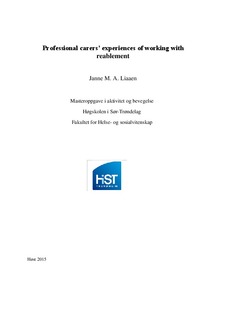Professional carers’ experiences of working with reablement
Abstract
Purpose. The purpose of this study was to provide knowledge about professional carers’ experiences of working with everyday activities within the framework of reablement.
Method. In this explorative study focus group discussions were utilised as a method for collecting data. There was a total of twenty-five participants across five focus groups. The participants were professional carers working in home care services across two municipalities. A grounded theory approach was used to analyse the data.
Results. The findings indicate that the professional carers have experienced working with reablement as exciting and challenging. Reablement has led to a change in how they work to ensure participation for service recipients. Implementing this change has led to having to negotiate dilemmas. However, the professional carers experienced it as a privilege to play a part in service recipients’ achievements.
Conclusion. Reablement can be a framework that allows for an increased focus on participation in everyday activities. Due to a shift from providing assistance to enabling participation, reablement was perceived as a positive framework for increasing independence for home care service users. Reablement can also be a framework for increased collaboration between professional carers and their service recipients. However, there is a need for focusing on how professional carers' can be better prepared for the dilemmas they encountered.
